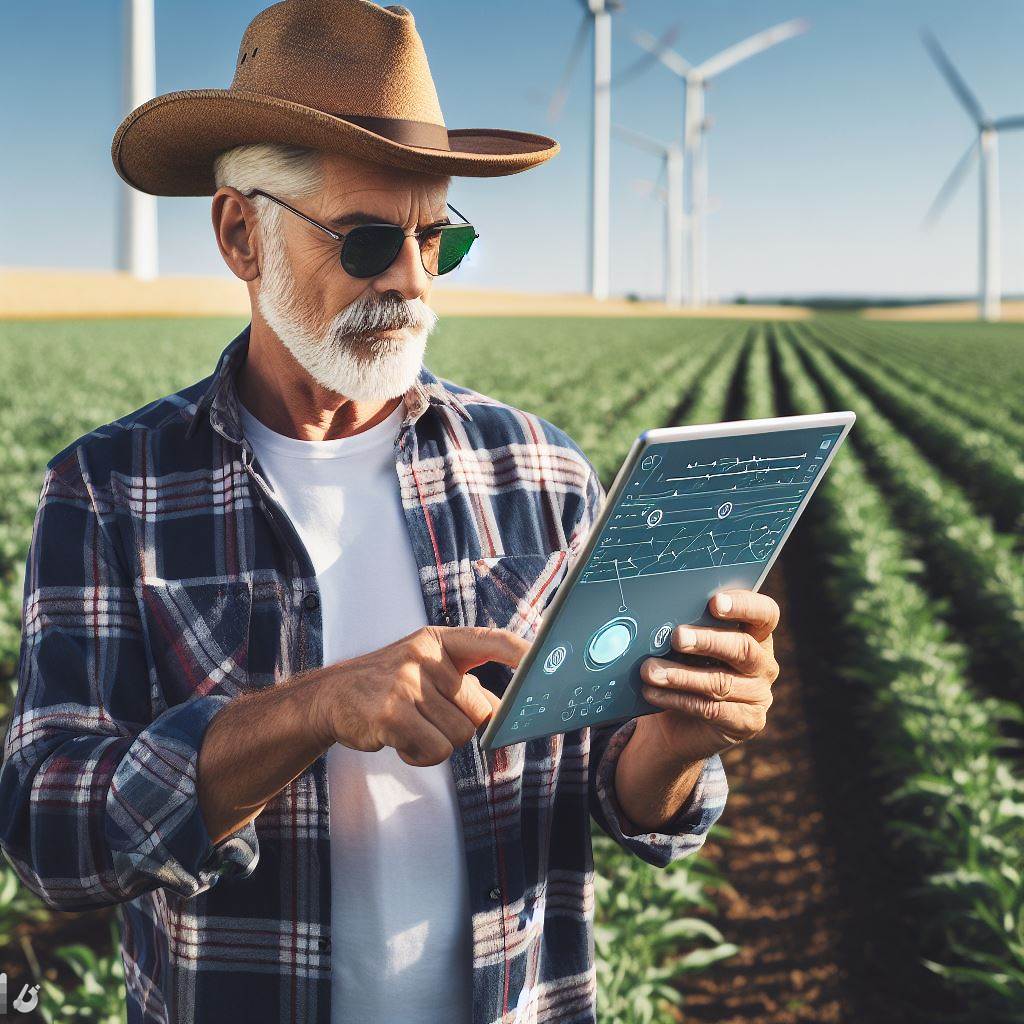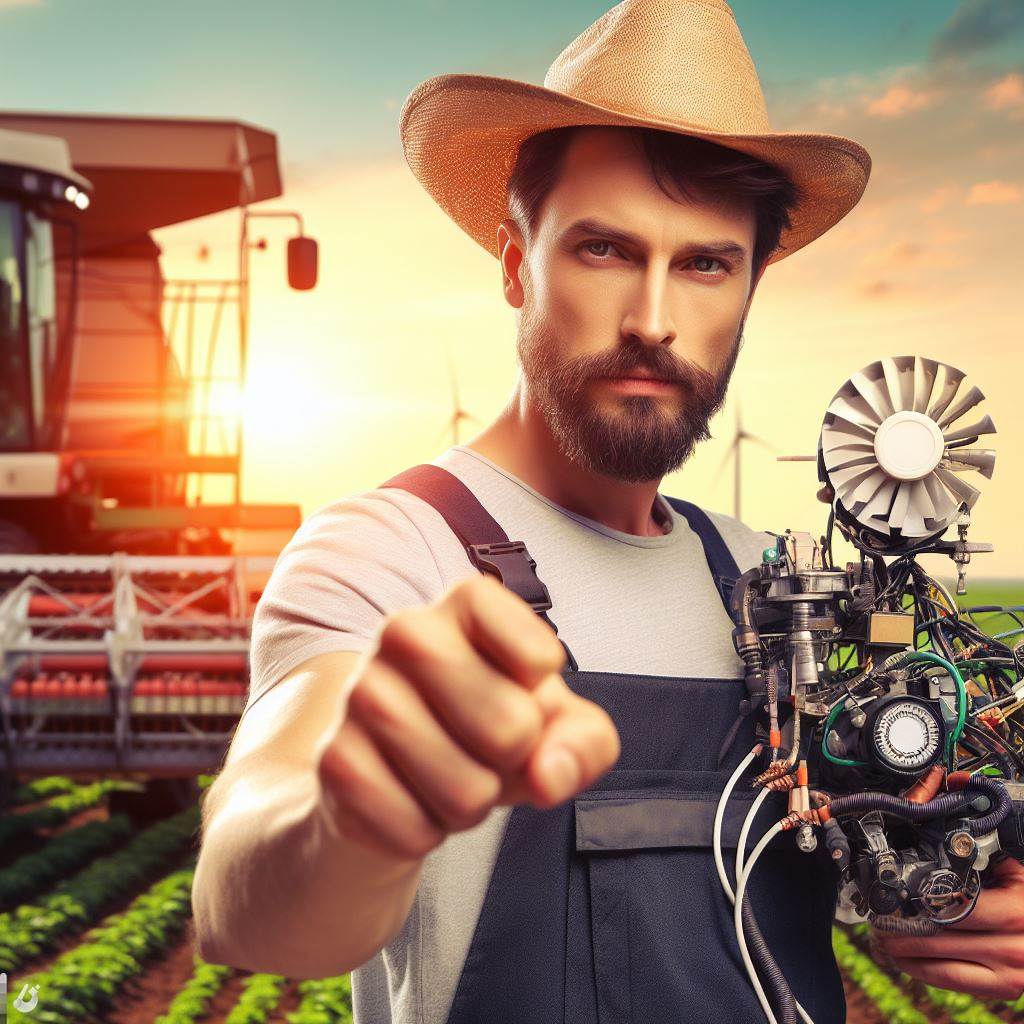Introduction
Smart Farming, also known as precision agriculture, is the integration of technology into farming practices to increase efficiency and productivity.
Smart Farming offers numerous benefits, including improved yield, reduced resource wastage, and early disease detection.
It has the potential to revolutionize the agricultural industry by addressing its challenges and ensuring sustainable food production.
Smart Farming incorporates various technologies such as sensors, drones, GPS, and cloud computing.
These technologies enable real-time monitoring of soil conditions, weather patterns, and crop growth, optimizing resource allocation.
Smart Farming provides farmers with accurate data about their crops, allowing them to make informed decisions.
The precise use of fertilizers, pesticides, and water minimizes waste and protects the environment.
Applying Smart Farming techniques leads to improved farm management and higher crop yields.
Farmers can remotely control irrigation systems and monitor livestock health, reducing labor costs and improving overall efficiency.
Smart Farming promotes sustainable farming practices by minimizing the use of chemicals and water resources.
By utilizing advanced technologies, Smart Farming reduces the industry’s ecological footprint and ensures long-term agricultural sustainability.
In short, Smart Farming is the future of agriculture due to its ability to enhance efficiency, productivity, and sustainability.
By embracing these technologies, farmers can overcome challenges and contribute to a more secure and sustainable food supply.
The Role of Technology in Smart Farming
Introduction to technology in agriculture
Technology has revolutionized the way agriculture is conducted, leading to the emergence of smart farming.
With the integration of various technological advancements, farmers can now optimize their operations and achieve higher productivity levels.
Transform Your Agribusiness
Unlock your farm's potential with expert advice tailored to your needs. Get actionable steps that drive real results.
Get StartedIn the past, traditional farming methods relied heavily on manual labor and guesswork.
Farmers had to rely on their experience and intuition to make decisions regarding crop planting, irrigation, pesticide use, and harvest timings.
This approach was time-consuming, inefficient, and often led to suboptimal results.
However, the advent of technology has transformed agriculture into a highly sophisticated industry.
Farmers now have access to a wide range of tools and devices that enable them to make data-driven decisions and streamline their operations.
Examples of how technology has transformed farming practices
One of the most significant advancements in agricultural technology is the use of precision farming techniques.
High-precision GPS systems, combined with sensors and aerial imagery, allow farmers to monitor and analyze their fields with extraordinary detail.
For instance, farmers can use these technologies to create precise soil maps, which provide valuable information about soil fertility and nutrient levels.
Armed with this data, they can adjust their fertilizer application rates, ensuring that crops receive the optimal amount of nutrients while reducing wastage and environmental impact.
Moreover, technology has also enabled the development of automated systems that can perform tasks autonomously.
Automated irrigation systems, for instance, can adjust water usage based on real-time weather data and plant needs, leading to efficient water management and minimized water waste.
Similarly, the use of drones has revolutionized the monitoring and assessment of crops.
These unmanned aerial vehicles can capture high-resolution images of fields, detecting issues such as nutrient deficiencies, crop diseases, or pest infestations.
This early detection allows farmers to take prompt actions, preventing significant crop losses and reducing the need for excessive pesticide use.
Explanation of how technology enables Smart Farming
Smart Farming goes beyond utilizing individual technological tools; it involves the integration of various technologies to create a holistic and interconnected farming system.
One crucial aspect of Smart Farming is the Internet of Things (IoT) technology, which enables different devices and sensors to communicate and exchange data.
For example, sensors placed in the soil can collect information about moisture levels, temperature, and nutrient concentration.
This data can then be transmitted to a central system that processes and analyzes it, providing farmers with real-time insights and recommendations.
Cloud computing also plays a vital role in Smart Farming, as it allows farmers to store, manage, and analyze vast amounts of data collected from multiple sources.
This data-driven approach enables farmers to make informed decisions, optimize resource allocation, and improve overall farm efficiency.
Furthermore, the use of artificial intelligence (AI) and machine learning algorithms can enhance the predictive capabilities of Smart Farming systems.
By analyzing historical data and patterns, these technologies can provide accurate forecasts for weather conditions, crop yield, and market demand.
This foresight enables farmers to plan their operations more effectively, reduce risks, and maximize profitability.
In fact, technology has become an indispensable component of modern agriculture.
Showcase Your Farming Business
Publish your professional farming services profile on our blog for a one-time fee of $200 and reach a dedicated audience of farmers and agribusiness owners.
Publish Your ProfileIts integration in farming practices has transformed the industry, enabling farmers to achieve higher productivity, sustainability, and profitability.
Smart Farming, driven by technological advancements like precision farming, automation, IoT, cloud computing, and AI, represents the future of agriculture, promising even greater efficiency and innovative solutions to global food challenges.
Read: Organic Farming: Pros and Cons
Applications of Smart Farming
Smart farming, also known as precision agriculture, is revolutionizing the agricultural sector.
By combining technology, data analysis, and innovative practices, it aims to optimize farming methods and increase productivity while minimizing environmental impact.
In this section, we will explore the various applications of smart farming.
Precision farming
Precision farming involves the use of sensors, GPS, and data science to collect and analyze data from fields.
This data is then used to make informed decisions about crop planting, fertilizing, and harvesting.
By precisely targeting resources, such as water, fertilizer, and pesticides, farmers can optimize yields and reduce input costs.
Livestock monitoring
Advancements in technology have led to the development of smart monitoring systems for livestock.
Sensors and wearable devices track the health and behavior of animals, providing real-time data to farmers.
This enables early detection of diseases, improves animal welfare, and enhances overall farm management.
Crop management
Drones equipped with high-resolution cameras and sensors are used in smart farming for efficient crop monitoring and management.
They provide farmers with real-time imagery, allowing them to detect crop stress, pests, and diseases.
This information helps farmers make timely decisions about irrigation, fertilization, and pest control, leading to higher crop yields and reduced environmental impact.
Water management
Water scarcity is a significant challenge in agriculture.
Smart farming addresses this issue through the implementation of smart irrigation systems.
These systems use sensors to monitor soil moisture levels and weather conditions, adjusting water supply accordingly.
By delivering the right amount of water at the right time, farmers can conserve water resources and improve water-use efficiency.
Supply chain management
Smart farming technologies also enhance supply chain management in the agricultural sector.
With the use of sensors, RFID tags, and blockchain technology, farmers can track the movement and condition of their products throughout the supply chain.
This ensures quality control, reduces waste, and improves transparency and traceability, benefitting both farmers and consumers.
In essence, smart farming offers a promising future for the agriculture industry.
With precision farming, livestock monitoring, crop management, water management, and supply chain management, the potential for increased productivity, sustainability, and profitability in agriculture is tremendous.
By embracing technology, farmers can optimize their practices, make data-driven decisions, and contribute to the development of a more efficient and sustainable food system.
Read: Agri Supply Chain Optimization

Benefits of Smart Farming
Increased productivity and efficiency
- Smart farming technologies such as precision agriculture and automated systems can significantly increase productivity on farms.
- These technologies enable farmers to monitor their crops and livestock more effectively, ensuring optimal conditions for growth and health.
- By using sensors and data analysis, farmers can make informed decisions to enhance productivity and reduce wastage.
- The use of drones and satellite imaging allows farmers to assess the needs of their crops and target specific areas for treatment, maximizing efficiency.
- Automated systems not only save time and labor but also minimize human error, leading to improved productivity.
Reduction in resource consumption
- Smart farming helps optimize the use of resources such as water, fertilizers, and energy.
- By monitoring soil moisture levels, farmers can precisely irrigate their crops, minimizing water wastage.
- Through data analysis, farmers can determine the exact amount of fertilizers needed for optimal plant nutrition, reducing excess usage.
- Smart sensors and automation can control energy consumption by adjusting lighting, temperature, and ventilation in livestock and greenhouse facilities.
- By optimizing resource usage, smart farming reduces costs for farmers while promoting sustainable practices.
Improved crop quality and yield
- Smart farming techniques enable farmers to monitor crops at a granular level, ensuring better quality and higher yields.
- Through advanced data analysis, farmers can identify diseases, pests, or nutrient deficiencies early, preventing damage and loss.
- By applying targeted treatments, such as precision spraying or specific nutrient application, crop health can be maximized.
- Smart farming technologies allow for real-time monitoring of environmental conditions, ensuring crops receive optimal sunlight, temperature, and humidity.
- With improved crop quality and yield, farmers can meet market demands and increase their profitability.
Enhanced sustainability and environmental conservation
- Smart farming promotes sustainable agricultural practices, reducing the environmental impact of farming.
- By optimizing resource usage, smart farming minimizes soil degradation, water pollution, and greenhouse gas emissions.
- Precision agriculture techniques reduce the need for excessive pesticide and fertilizer application, minimizing chemical runoff.
- Efficient irrigation systems conserve water, which is especially crucial in regions facing water scarcity.
- By adopting smart farming practices, farmers contribute to overall environmental conservation, preserving natural resources for future generations.
In general, smart farming offers numerous benefits to farmers and the environment.
By increasing productivity and efficiency, reducing resource consumption, improving crop quality and yield, and enhancing sustainability, smart farming is revolutionizing the agricultural industry.
With the help of advanced technologies, farmers can optimize their operations and contribute to a more sustainable and greener future.
Read: Risk Management in Farming
Challenges and Limitations of Smart Farming
Initial setup costs and infrastructure requirements
Smart farming, like any new technology, comes with significant initial setup costs and infrastructure requirements.
Farmers need to invest in sensors, automation systems, and connectivity tools to implement these farming practices.
The cost of purchasing and installing these technologies can be a barrier for small-scale farmers who may not have the financial resources to make such investments.
Additionally, the need for stable internet connectivity and power supply can pose challenges in remote or underdeveloped areas.
Complexity of data management and analysis
One of the biggest challenges in smart farming is effectively managing and analyzing the vast amount of data generated by sensors and other smart devices.
The complexity of data management systems and analysis tools can be overwhelming for farmers.
Farmers may require training and technical expertise to extract valuable insights from the collected data.
Without proper data management and analysis, the potential benefits of smart farming may remain untapped.
Concerns regarding data privacy and security
The collection and analysis of farm data raise concerns about data privacy and security.
Farmers need assurance that their sensitive information, such as crop yield data or farming practices, will be protected against unauthorized access or misuse.
Showcase Your Farming Business
Publish your professional farming services profile on our blog for a one-time fee of $200 and reach a dedicated audience of farmers and agribusiness owners.
Publish Your ProfileSmart farming systems must have robust security measures in place to safeguard data from cyber threats.
Establishing data anonymization and encryption practices can mitigate these concerns and build trust among farmers.
Limited accessibility and digital divide among farmers
A significant limitation of smart farming is the limited accessibility to technology and the digital divide among farmers.
Not all farmers have equal access to high-speed internet or smartphones necessary for implementing these farming practices.
This digital divide can create disparities in farm productivity and income levels, as farmers with limited access to technology may be unable to benefit from advanced farming techniques.
Bridging this divide through government initiatives and collaborations is essential for empowering all farmers.
While smart farming holds great promise for revolutionizing agriculture, it also comes with its own set of challenges and limitations.
The initial setup costs, complexity of data management, concerns about data privacy and security, and limited accessibility for all farmers need to be addressed for smart farming to reach its full potential.
Efforts should be made to provide financial assistance and technical support to farmers, especially small-scale ones, to overcome the financial burden of setup costs.
Training programs and user-friendly interfaces can help farmers manage and analyze data effectively, ensuring they can make data-driven decisions.
Furthermore, government bodies and technology providers must collaborate to ensure data privacy and security measures are in place, inspiring trust and confidence among farmers.
Lastly, closing the digital divide by improving internet access and smartphone availability will ensure that all farmers can benefit from the advantages of smart farming.
Moreover, by addressing these challenges and limitations, smart farming can truly become a sustainable and efficient approach to agriculture, contributing to food security and environmental conservation.
Read: Crop Diversification Strategies
Future Possibilities of Smart Farming
Integration of Internet of Things (IoT) and artificial intelligence (AI) technologies
The combination of IoT and AI will revolutionize farming by enabling real-time data collection and analysis for optimized decision-making.
Development of autonomous farming systems and robotic automation
Advanced robotics will take over labor-intensive tasks, such as planting, harvesting, and monitoring crops, resulting in increased efficiency and reduced costs.
Expansion of smart farming practices to indoor farming and vertical agriculture
Indoor farming utilizing controlled environments and vertical agriculture in urban areas will become more prevalent, ensuring year-round production and minimal resource usage.
Collaboration and knowledge sharing among farmers to accelerate adoption
Farmers will form networks to exchange information, experiences, and best practices, fostering innovation and driving widespread adoption of these farming techniques.
Explore Further: Tech in Agri: Transforming Supply Chain Logistics
Conclusion
Smart Farming has emerged as a revolution in the agricultural sector, providing new opportunities for increased productivity, cost savings, and environmental sustainability.
It is crucial for farmers to adapt and adopt these innovative technologies to stay competitive and meet the growing demands of a rapidly evolving world.
With the continuous advancements in Artificial Intelligence, Internet of Things, and data analytics, the future of Smart Farming looks highly promising.
By leveraging precision agriculture, automation, and real-time monitoring, farmers can optimize yields, reduce wastage, and enhance sustainability.
The potential of Smart Farming extends beyond improving efficiency and profitability.
It also plays a significant role in addressing global challenges such as food security, climate change, and water scarcity.
Embracing Smart Farming practices not only benefits individual farmers but also contributes to the overall well-being of society and the planet.
To fully grasp the benefits of Smart Farming, it is necessary for farmers to actively engage in research and development, stay updated with the latest technological advancements, and collaborate with experts in the field.
Moreover, by doing so, they can unlock the full potential of Smart Farming and prepare for a successful future in agriculture.
As Smart Farming continues to evolve and gain momentum, it is essential for farmers to embrace these technological advancements wholeheartedly.
By doing so, they can revolutionize their farming practices and pave the way for a sustainable and prosperous future in agriculture.




